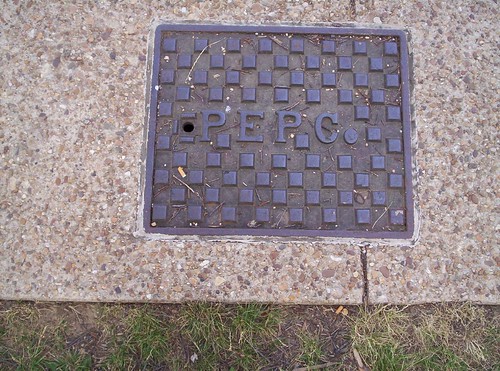Government owned utilities such as the Tennessee Valley Authority were created in part because of a belief that the private sector companies charged too much, and also to serve areas that were underserved.
Of course, failure of utility holding companies during the Great Depression didn't help the reputation of privately owned utility companies either.
Still, the private sector utility field has always pushed hard against government owned utilities. They don't like the counter-example that these organizations provide.
As Mayor of Cleveland, much of the political animus surrounding Dennis Kucinich was his unwillingness to sell the city-owned utility company (which is still owned by the city today).
After the Enron debacle, local governments looked at the idea of purchasing Portland General Electric, a utility company owned by Enron, to convert to a citizen-owned entity, but business interests weren't favorable, and the concept was scuttled once a private offer materialized.
Because municipal utility companies have always been denigrated by private sector "investor-owned" utility companies, it shouldn't be a surprise that Barry Rascovar of the
Gazette of Politics and Business, in "
Don't let government run power companies" and the
Examiner, in "
Mopco would be even worse than Pepco," have editorialized against Montgomery County, Maryland's dreams, led by Councilman Roger Berliner, to take over Pepco's utility power distribution assets and run the utility, in response to frequent maintenance and power failures by the company.
While it is true that some locally owned government utilities, like Philadelphia Gas Works have been known to be founts of political patronage and corruption, the reality is that there are some really good examples (and remember there aren't many examples of government-owned utilities in the U.S.) of some exemplary government owned utility operations.
Protection against price manipulation
The deregulation of electricity production and distribution in most U.S. states in the 1980s and 1990s, which led to the decoupling of power generation from the distribution and delivery infrastructure makes it difficult for a govt. owned utility to make much difference in how utilities are operated are today.
However, the experience of the Los Angeles Dept. of Power and Water during the Enron-driven manipulation of electricity supplies in California, which led to the bankruptcy of Pacific Gas & Electric, and the near bankruptcy of Southern California Edison is instructive. When you own your own power generation plants and you don't manage your system to maximize profit and manipulate markets, customers are protected.
Other innovative local government utilities
Other interesting examples are Seattle City Light and the local power boards that serve particular areas within the Tennessee Valley Authority service area. Seattle City Light supports payment counters in municipal service buildings throughout Seattle, and has other policies which support streetscape and other local improvements.
The Electric Power Board in Chattanooga is leading the way nationally in the creation of a local "Smart Grid," which in the Chattanooga region includes piggybacking on the the electricity distribution infrastructure to deliver high speed broadband services (150Mbps minimum) to every household and business.
Locally, in the comments, spookiness pointed out that the City of Manassas in Virginia provides electric service within the city, and because much of the infrastructure is underground, it's less likely to be subject to weather-related power outages. The department also provides water and sewer services. (I'll have to find out more about the history of this service.)
Electricity co-operatives
During the Depression, one of the initiatives of the federal government was the support of creation of member-owned co-operatives in rural areas to create distribution systems and deliver electricity to member-customers, to serve areas that were not otherwise served by utility companies. There are two types of co-operatives, those that serve the customers, and then collectively co-operatives may join together to own distribution and power generation infrastructure.
Cable television
There are some examples of municipally-owned cable television organizations which deliver cable television services directly to citizen-customers. San Bruno, California and Russell, Massachusetts are two examples of city-provided cable television services.
Broadband/High-speed Internet services
There are many examples of city and state departments being set up to provide broadband Internet services. Iowa's statewide network in the 1990s was one of the earliest examples. These initiatives tend to be fought vociferously by cable television and telephony interests. As mentioned above, EPB is delivering these services to its customers in Greater Chattanooga, Tennessee.
But, because the the frequent changes in the technological requirements and/or capabilities (e.g., broadband vs. wireless), providing this kind of service can be problematic. There have been failed/unsuccessful operations as well.
Water
And for good or ill, in much of the country, including the DC-MD-VA region, local water and sewer services tend to be provided by government agencies. The need for massive upgrades to the sewer infrastructure due to changes in EPA regulations has made for serious budget problems, because political appointees to boards tend to want to keep rates down, and millions and billions of dollars are required to fund the EPA-required improvements.
In DC, there have been problems at times with the quality of management of DCWASA now called DC Water, although under current director George Hawkins, the organization has implemented smart branding and other initiatives.
Washington Suburban Sanitary Commission, which is a joint agency for Montgomery and Prince George's Counties, is typically deadlocked over MoCo vs. PGCo interests and the agency doesn't function very well at the management level.
In Falls Church, Virginia, the city owned water agency charged non-city customers significantly higher rates, and is now being forced to rebate the overcharges.
So area water delivery services might not be a good example in terms of supporting a bid for a citizen owned electricity agency in Montgomery County.
No reason for citizen owned utility agencies to cut back on maintenance to increase profits and pay dividends
However, it could be that not having the profit imperative, the need to pay dividends, and manage stock prices, a government owned operation wouldn't stint on maintenance, which appears to be what PEPCO had been doing, although in the face of regulatory fire and criticism, they're refocusing.
Note that this is dependent on whether or not the agency fully controls its revenues. If the general city government can sweep off "profits," government owned utilities can have problems with their budgets and may be forced to reduce spending on vital services.
Flickr photo by Daquella Manera.
Citizen-owned utilities won't pay stratospheric executive salaries
Similarly, there is no way that a government-owned utility would pay the leaders of the "department" the close to $3 million (about $900,000 in salary, the rest in stock options and other considerations) received by Joseph Rigby, Chairman of Pepco Holdings. Mayo Shattuck, the Chairman of the company that owns Baltimore Gas & Electric, received almost $16 million in compensation in 2010.
Granted both companies are larger than just their local operations. But that's still a lot of "overhead" to carry, overhead that wouldn't be built into government agency utility organizations and the pricing of the delivery of electricity.
Are area local governments innovative enough to deliver high quality utility services?
That's an open question. Montgomery County Government doesn't stick out as being particularly innovative and skillful at delivering these kinds of services, although it does run a nationally-respected suburban bus service that is one of the more highly used suburban bus services in the U.S.
Still, the idea shouldn't be rejected out of hand.
Just as the TVA provides an example for how to run utility "companies" differently (granted, not always better), the same goes for municipal/county government managed utility functions, although again, the example of WSSC is troubling, although because it is a bi-county agency, it is set up from the outset for these kinds of failures, whereas an intra-county operation wouldn't have the same problems.
Yes, financing the acquisition of the infrastructure is an issue, and yes, the State Legislature will have to approve new legislation allowing it, but these are relatively minor issues when it comes down to it.
And, it's not like Pepco has done such a great job that they warrant a pass on the idea.





1 Comments:
Power companies spend millions to fight Maine’s proposed non-profit utility
https://www.theguardian.com/us-news/2023/jun/18/maine-state-run-utility-power-companies
Supporters want to buy out the assets of Central Maine Power (CMP) and Versant Power – which distribute 97% of the state’s electricity – and replace them with Pine Tree Power, a new, not-for-profit distribution utility.
The ballot initiative has already been outspent 17 to one by the parent companies of the two utilities, Avangrid and Enmax. Together, the two legacy power companies have given $18.4m to three ballot committees, which have spent $16.5m fighting back against what they see as an existential threat. Those committees received 100% of their funding from the utilities.
The referendum presents a threat not only to Avangrid’s business model in Maine, said Colburn, the former energy policy consultant, but to the utilities it operates in Connecticut and New York.
Public power advocates point to the Orlando suburb of Winter Park, Florida, to bolster their case. Residents there voted in 2005 to buy the assets of the incumbent power company. It is among 2,000 towns and cities served by not-for-profit electric companies, according to the American Public Power Association.
=====
I didn't know about the Winter Park, Florida example from 2005, when I wrote this entry.
Post a Comment
<< Home